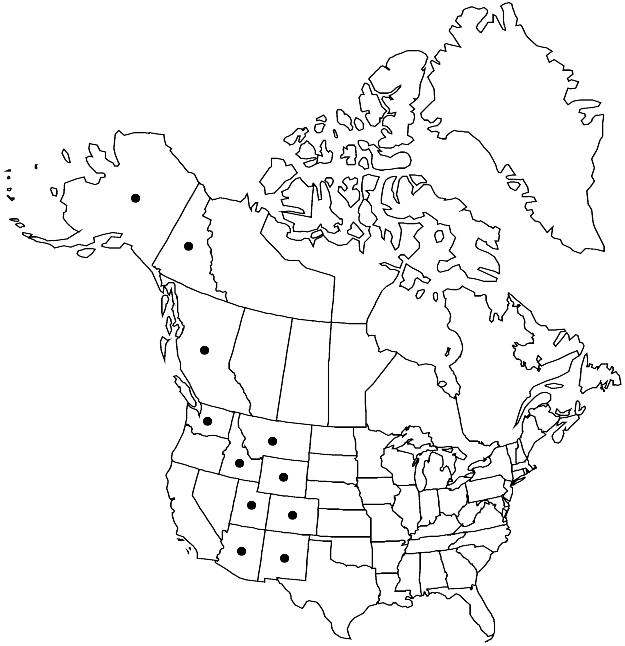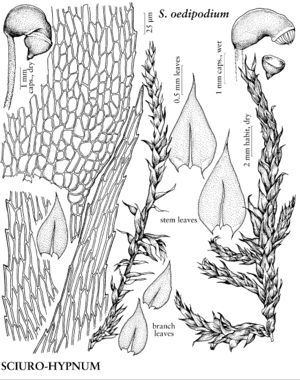Sciuro-hypnum oedipodium
Arctoa 11: 270. 2003.
Plants medium-sized, rarely large or small, in loose tufts, light green, often stramineous. Stems to 5 cm, ascending, arching, often curved distally, terete-foliate, irregularly pinnate, branches to 7 mm, often curved, terete-foliate. Stem-leaves erect, imbricate or sometimes erectopatent, ovate, concave, not or slightly plicate, (1.2–) 1.6–2.2 × (0.5–) 0.7–1.1 mm; base broadly long-decurrent, conspicuous; margins plane or often recurved below broadest part of leaf, serrulate; apex short to long-acuminate; costa to 55–75% leaf length, moderately weak, terminal abaxial spine absent; alar cells broader than juxtacostal cells, 15–25 × 12–16 µm, walls moderately thick, transverse perpendicular to their length, region conspicuous, appearing opaque because of collapsed cytoplasm; laminal cells elongate to linear, (25–) 40–70 (–110) × 6–10 µm; basal juxtacostal cells short-rectangular to ovate, shorter than laminal cells, region in 3 rows. Branch leaves with base asymmetric; margins recurved below broadest part of leaf on both sides, slightly serrulate; apex gradually acuminate; costa strong. Sexual condition autoicous. Seta reddish orange, 1.5–2 cm, rough, often indistinctly so. Capsule strongly inclined, horizontal, or pendent, reddish orange, usually short-ovoid, rarely ovoid-elongate, usually not curved or, when longer, slightly curved dorsally, 1.2–1.4 (–1.7) mm. Spores 13–16 µm.
Habitat: Duff, decaying wood, humus, mineral soil, thin soil layers over rock
Elevation: low to high elevations (40-3700 m)
Distribution

B.C., Yukon, Alaska, Ariz., Colo., Idaho, Mont., N.Mex., Utah, Wash., Wyo., Asia (Caucasus), Asia (Chukotka)
Discussion
Sciuro-hypnum oedipodium has been identified as Brachythecium starkei by North American authors; S. Piippo (1983) demonstrated important differences but included B. curtum in its synonymy, causing additional problems as discussed by M. S. Ignatov and I. A. Milyutina (2007). Sciuro-hypnum oedipodium is extremely variable in size; one of its synonyms, B. holzingeri, was originally described as a variety of Brachytheciastrum collinum, one of the smallest species of Brachythecium in the broad sense, while later it was synonymized with Sciuro-hypnum curtum, one of the largest species. Most collections of S. oedipodium are of robust forms, but also exhibit plant size variation. Leaves from robust shoots usually have linear cells (7–11:1), whereas slender shoots from the same collection may have cells as short as those of S. reflexum or Brachytheciastrum collinum (3–5:1). However, the plant has a characteristic appearance, distinguished by its often pale brownish color (relatively pale leaves and brown stem cortex), leaves relatively densely arranged and plainly reflexed from appressed base, curved branches (similar to those of S. reflexum, but considerably larger), and often short capsules (also as in S. reflexum). Branch foliage is typically subjulaceous, more rarely homomallous to slightly falcate-secund. Sporophytes are frequent.
Selected References
None.
Lower Taxa
"long" is not a number."broadest" is not a number. "broadest" is not a number."broad" is not a number.
